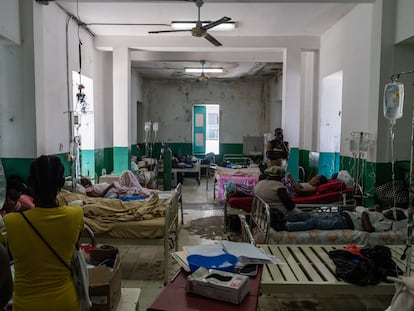Violence condemns Haiti: Red Cross warns that ‘life is becoming increasingly precarious’
The Caribbean country has recorded at least 75 deaths from attacks in recent days. Basic services have been paralyzed, schools have closed, and the health system is collapsing
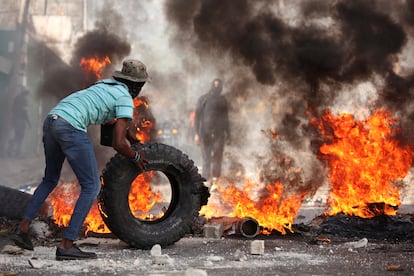

The international humanitarian organization Doctors Without Borders (MSF) has decided to close two healthcare centers in Port-au-Prince due to the violence faced by its staff. Gabriel Mayorga, MSF’s Humanitarian Affairs Manager in Haiti, explained that four of its vehicles were attacked while traveling in a convoy, and three of them were hit by 15 bullets, demonstrating the harassment the NGO is experiencing in the country. “Although none of our colleagues suffered serious injuries, it was clear that there are repeated and increasingly intense attacks against health services, and in this case against MSF,” Mayorga warned. “We hope that all actors provide us with minimum guarantees and respect so that we can continue providing care to all victims of violence, internally displaced persons, and survivors of sexual violence.”
The attack is yet another chapter in the nightmare of violence the small nation has endured, where at least 75 deaths have been recorded due to the tightening grip of criminal gangs in recent days. The International Red Cross has warned that basic services have been paralyzed, schools have closed, and the health system is collapsing. Clashes between armed groups and government forces have plunged the country into chaos. “Life is becoming increasingly precarious,” the organization warned.
“Today, April 8 [Tuesday], we are announcing the suspension and temporary closure of two Doctors Without Borders hospitals in Port-au-Prince. This is an initial three-month suspension for the Turgeau emergency projects and the Carrefour trauma hospital. All of this in a context where the public health sector lacks the resources, capacity, or access to respond to these types of health issues,” Mayorga explained in an audio recording. “Unfortunately, this decision was made after an internal analysis and reflection, based on multiple incidents, attacks, and threats we have received since 2024, which increased in intensity and frequency at the end of 2024 and have continued into 2025.” The organization has assured that it will continue working with other projects in other areas of Port-au-Prince, but has demanded security guarantees from the authorities. “The population most in need requires a response in health services and other types of protection in this context,” Mayorga stated.
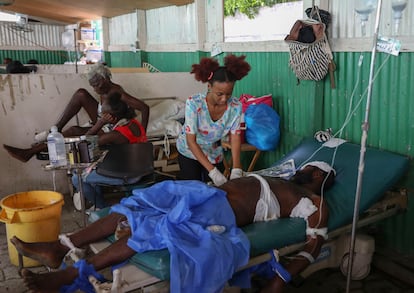
Violence continues unabated in Haiti. The dozens of murders in recent days are a consequence of clashes between gangs that control most of the country, a bloody confrontation that sows terror among the population and wages war against the decimated Haitian security forces. Since the assassination of President Jovenel Moïse in 2021, the country has suffered a power vacuum that violent groups have exploited. Human rights organizations and the United Nations estimate that the dispute over control of the capital by terrorist groups has escalated to such an extent that they now control more than 80% of Port-au-Prince. The violence has resulted in more than 5,000 murders, kidnappings, more than a million people forcibly displaced both internally and internationally, and systematic rapes. The atrocities of recent days, fueled by disputes between 60 gangs, have taken their toll on the municipalities of Mirebalais and Saut d’Eau in central Haiti, Efe reports, citing statements made Wednesday by Délin Boyer, director of the central department of the National Police. “The work continues. We continue to push back the gangs to force them to abandon the city permanently. The work isn’t easy, but we need everyone’s support, especially that of the civilian population,” the official stated. Boyer’s words sound more like a cry for help than a real step forward in stopping the criminals.
The International Red Cross warned in a statement released this week that clashes between armed groups from the Viv Ansanm coalition and government forces have “dragged the country into a spiral of chaos that has made it nearly impossible for people to get the services they need.”
“All needs here are urgent,” said Marisela Silva Chau, head of the International Committee of the Red Cross (ICRC) delegation in Haiti. “Basic services have ground to a halt: schools are closing, the healthcare system is collapsing, and finding food and water has become extremely difficult. This is true both for people who have had to leave their homes and for those who remain in these embattled areas.” The ICRC stated that since January 2024, more than 5,600 people have died and more than one million have been forced to leave their homes. The crisis has worsened since November 2024, with fighting reaching several new areas, including Kenscoff in February 2025 and Mirebalais in March 2025, the agency warned.
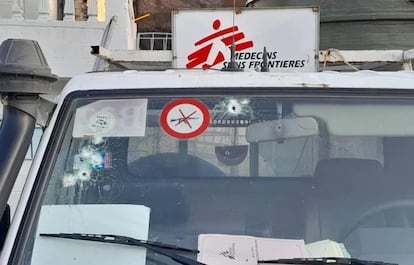
Journalists and the media in general are also victims of this gruesome situation. A Reporters Without Borders report warns of harassment, threats, and acts of violence against reporters and correspondents, many of whom are forced into censorship and exile, in addition to suffering from a lack of resources, the apathy of authorities, and difficult access to reliable sources of information. At least 15 journalists have been murdered in recent years. “Since 2021, they have also been targeted by criminal gangs and have been victims of threats, attacks, kidnappings, or murders with complete impunity. Since the fall of Ariel Henry’s government in March 2024, journalism has been even more trapped between a wave of widespread violence and the social, economic, and political crisis,” the organization states.
Violence has left a trail of destruction and misery in a country still reeling from the devastating 2010 earthquake. “Hospitals are no longer able to function properly: the State University Hospital of Haiti, the country’s largest public hospital, came under attack as it was about to reopen [...] In many neighborhoods, getting drinking water has become a daily challenge and, in some cases, a mortal danger. Often, residents take their lives in their hands when going in search of water, as some distribution points are located in areas affected by the armed clashes. Both public and private water suppliers hesitate to venture into these neighborhoods given the risk of attack,” reports the Red Cross Committee.
The Haitian tragedy also affects education, as more than 200 schools have been destroyed since 2024 and many more have had to close, while others are occupied by displaced families. “Hundreds of thousands of children are not able to attend school — a factor that could exacerbate the country’s instability over the long term. And then there’s the silent trauma of sexual violence, which has risen sharply. In January 2025, the UN reported a 1,000% increase in the number of cases of sexual violence against children,” according to the ICRC.
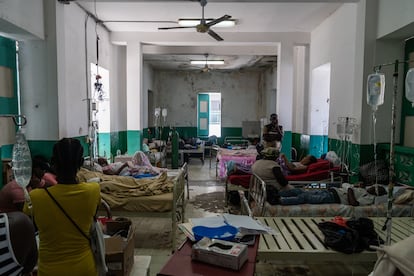
The population of Haiti is suffering the greatest humanitarian crisis in the heart of the Western Hemisphere, with no real interest from the major powers in the fate of the small country, a former colony devastated by the voracity of its conqueror, France. “The explosion in violence and the endless attacks are psychologically devastating,” said Silva Chau. “Something must be done urgently to prevent sexual violence, ensure people’s safety and treat victims. And both families and communities require psychological support to move past these traumatic experiences,” the ICRC official urged.
Sign up for our weekly newsletter to get more English-language news coverage from EL PAÍS USA Edition
Tu suscripción se está usando en otro dispositivo
¿Quieres añadir otro usuario a tu suscripción?
Si continúas leyendo en este dispositivo, no se podrá leer en el otro.
FlechaTu suscripción se está usando en otro dispositivo y solo puedes acceder a EL PAÍS desde un dispositivo a la vez.
Si quieres compartir tu cuenta, cambia tu suscripción a la modalidad Premium, así podrás añadir otro usuario. Cada uno accederá con su propia cuenta de email, lo que os permitirá personalizar vuestra experiencia en EL PAÍS.
¿Tienes una suscripción de empresa? Accede aquí para contratar más cuentas.
En el caso de no saber quién está usando tu cuenta, te recomendamos cambiar tu contraseña aquí.
Si decides continuar compartiendo tu cuenta, este mensaje se mostrará en tu dispositivo y en el de la otra persona que está usando tu cuenta de forma indefinida, afectando a tu experiencia de lectura. Puedes consultar aquí los términos y condiciones de la suscripción digital.

